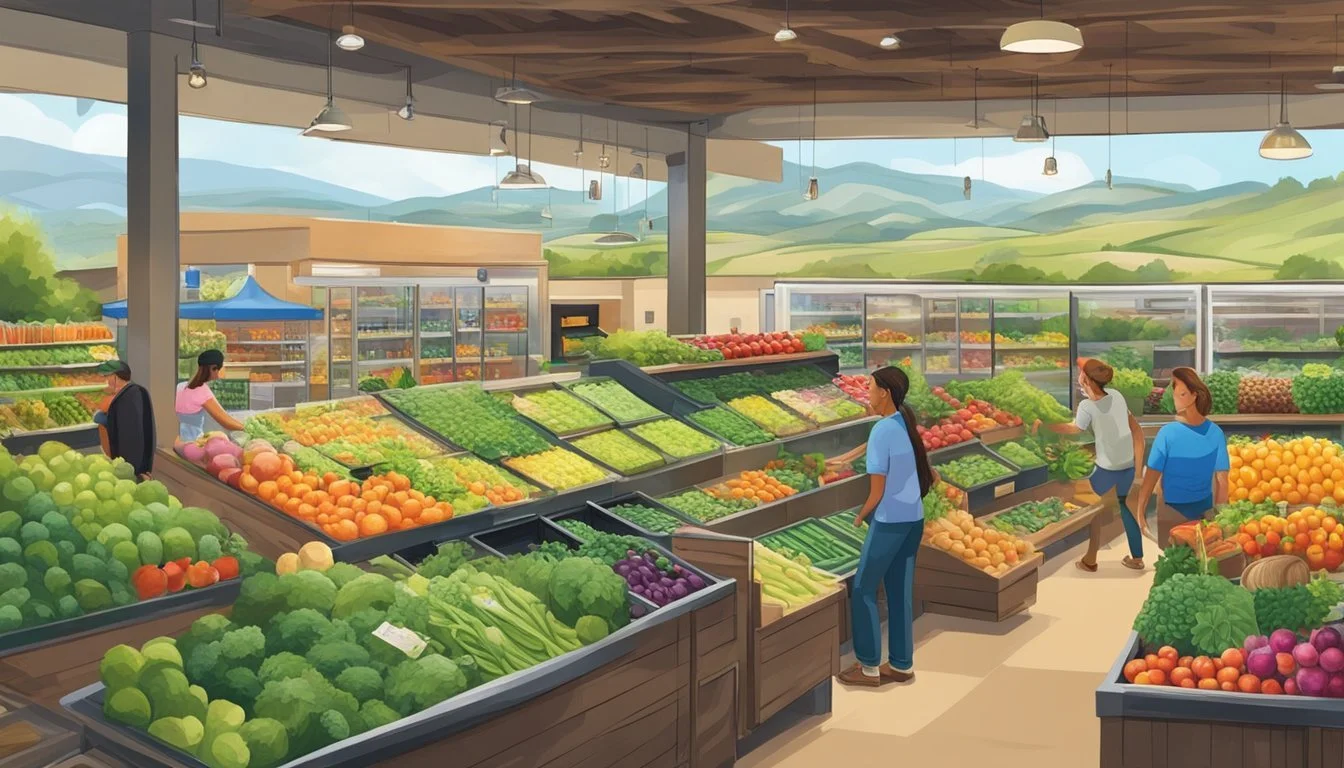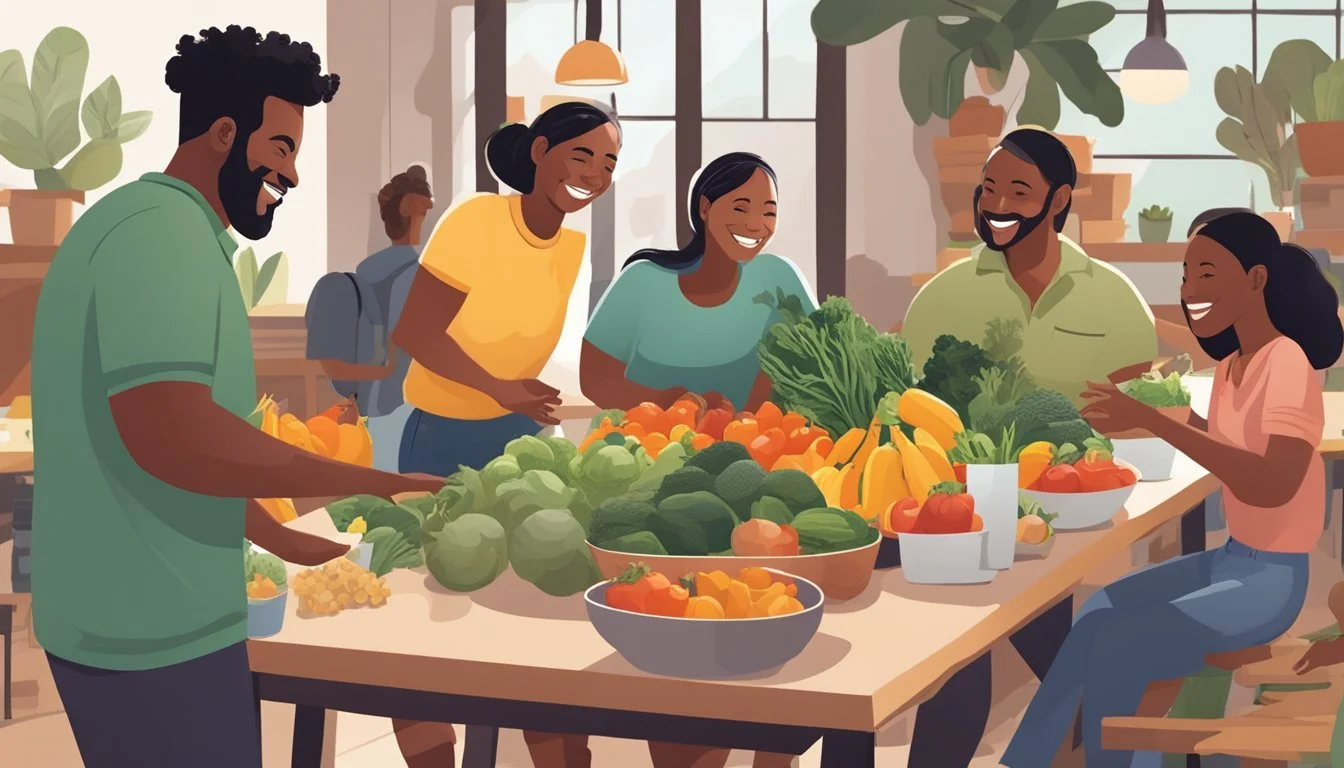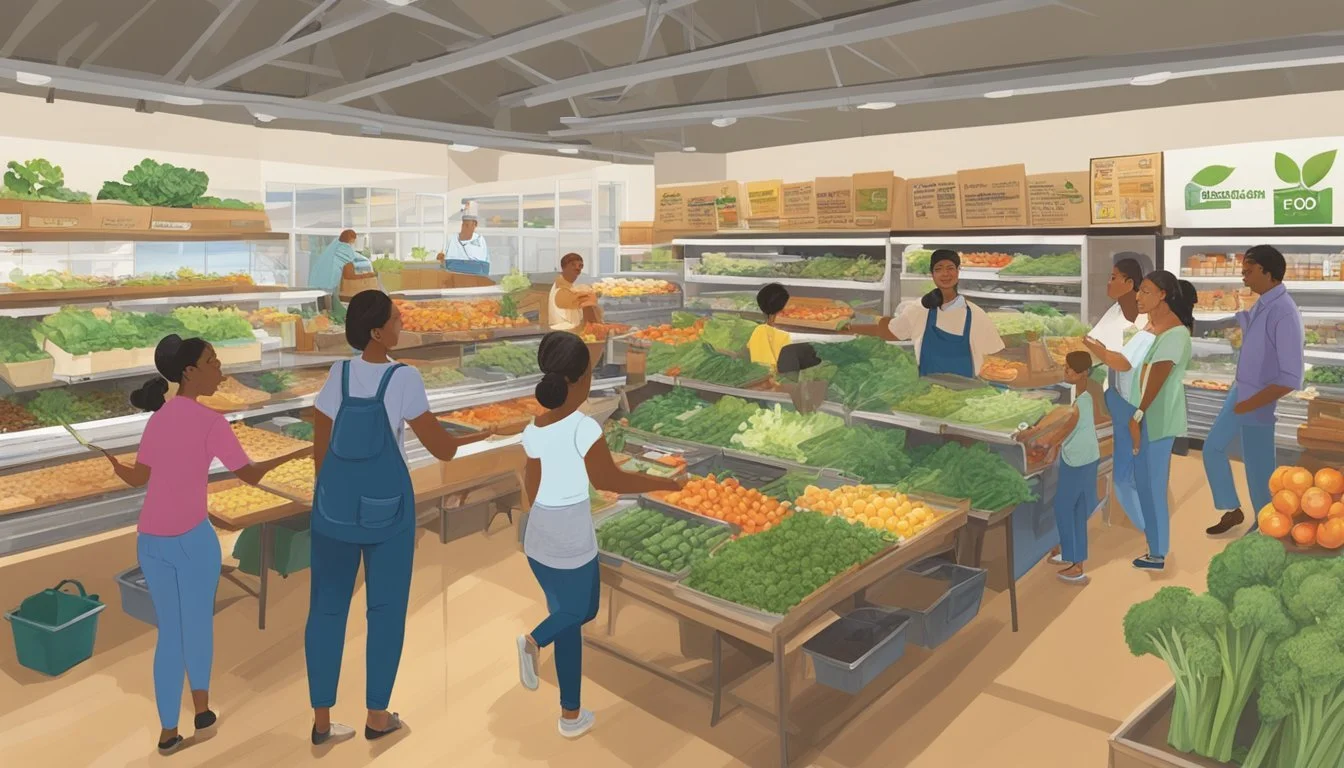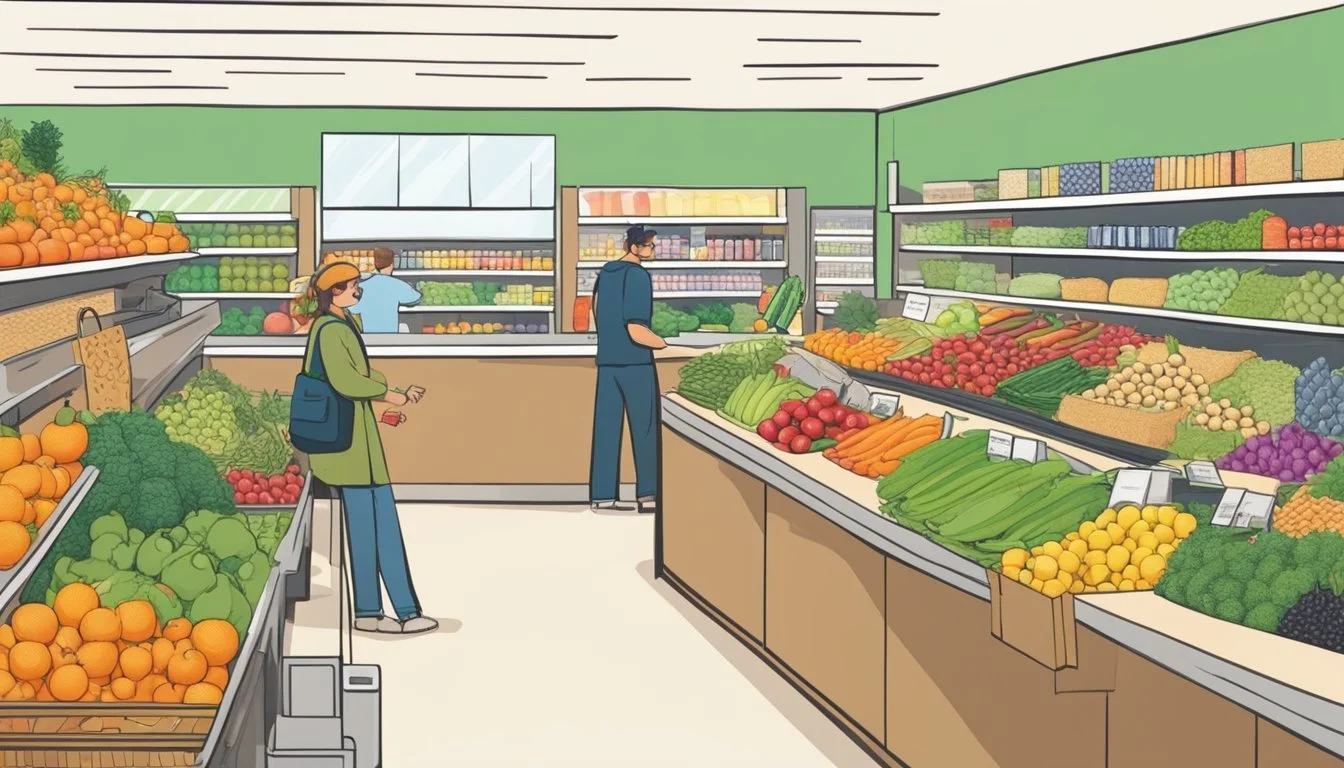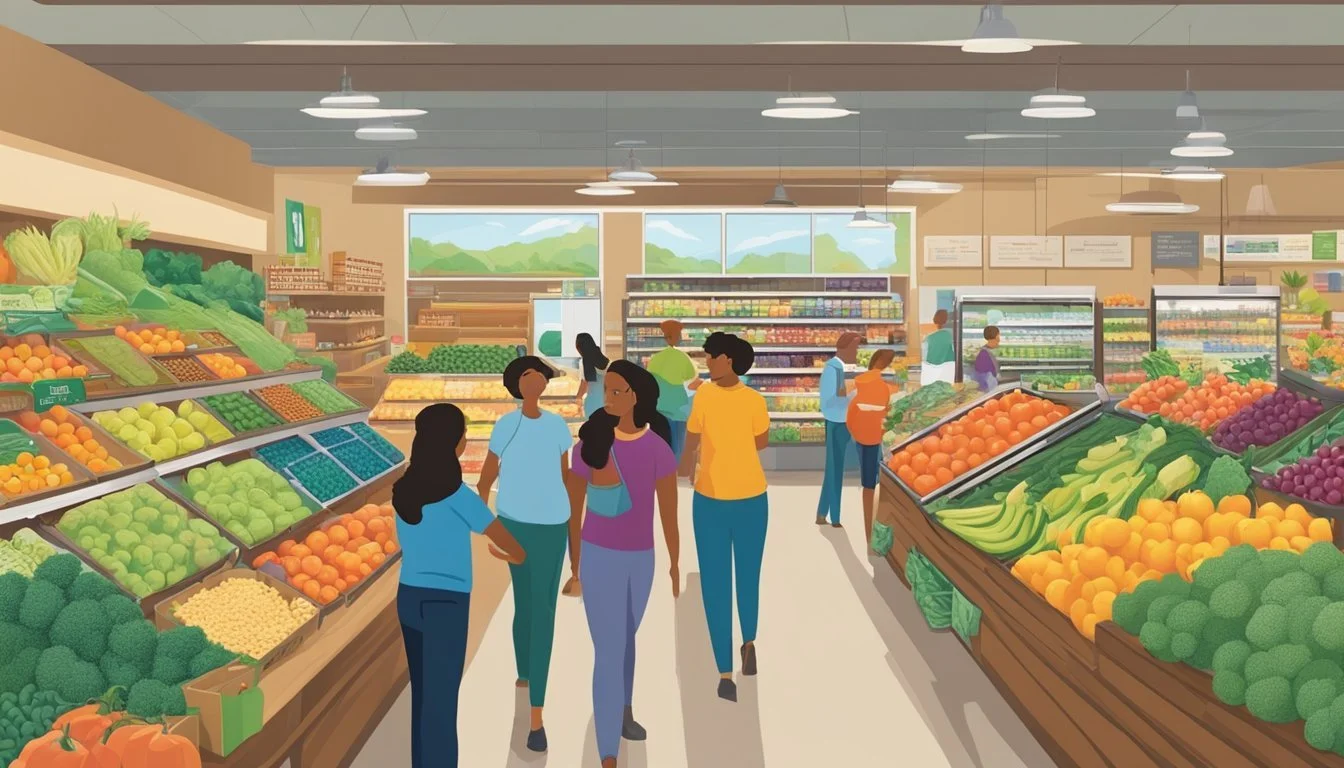Guide to Food Co-Ops in Chula Vista, CA
Your Local Shopping Compass
Chula Vista, California, a vibrant city close to San Diego, offers a diverse array of food options with an emphasis on community-based shopping experiences. Food cooperatives, or food co-ops, are a significant part of this landscape. They are member-owned marketplaces offering a variety of organic and local products. These co-ops are not only known for their quality and freshness but also for their commitment to sustainable practices and support for local growers and producers.
The demand for organic produce and non-GMO products in Chula Vista echoes the wider trend of health-conscious shopping. Locals have access to a rich selection of organic options, often found in these cooperative groceries. Food co-ops in the area aim to provide consumers with not just groceries but also a sense of community involvement and shared ownership.
Strolling through Chula Vista's food co-ops, customers will find that they are much more than stores; they are part of a movement towards a more socially responsible way of eating and shopping. By supporting these establishments, members and non-members alike contribute to a food system that values environmental stewardship, ethical food production, and the well-being of the local community.
Understanding Food Co-ops
Food cooperatives in Chula Vista, CA, offer a unique approach to grocery shopping by emphasizing community ownership and democratic control. These co-ops are not just stores, but a representation of collaboration and shared values within a community.
History of Co-ops
The concept of cooperatives traces back to the first successful co-op founded in Rochdale, England, in 1844. This historic milestone set the stage for cooperatives worldwide, including food cooperatives. In the United States, food co-ops gained momentum during the 1960s and 70s, mirroring social change movements.
Cooperative Business Model
The cooperative business model is a distinct approach where a business is owned and run jointly by its members, who share the profits or benefits. In the context of food cooperatives:
Members may contribute financially and have the right to vote on important matters.
Profits are commonly reinvested into the co-op or distributed among members.
The purpose of a co-op extends beyond profit-making, focusing on service to members and community well-being.
Co-ops adhere to values such as self-help, self-responsibility, democracy, equality, equity, and solidarity.
They operate according to cooperative business principles like voluntary and open membership, democratic member control, and concern for community.
Food cooperatives strive to serve their members according to these values and principles, creating not just a shopping destination, but a communal space that reflects the cooperative spirit.
Benefits of Food Co-ops
Food Co-ops in Chula Vista not only offer access to fresh, organic produce but also provide a platform for local economic growth, community engagement, and environmental sustainability. These co-ops foster healthier lifestyle choices among consumers.
Economic Benefits
Food co-ops contribute to local economic development by purchasing from local producers and ethical suppliers. This supports the area's economy by keeping money within the community. Additionally, they provide opportunities for locals to learn new skills and gain work experience, which can lead to job creation.
Supports local producers: By buying goods from local suppliers, food co-ops help in sustaining the livelihood of these producers.
Recirculates money locally: When consumers spend money at food co-ops, that money has more chance of staying within the locality.
Social and Community Benefits
Food co-ops serve as community hubs, where people can come together, share knowledge, and participate in decision-making. They are inclusive spaces offering a sense of ownership to the member-owners, who have a voice in cooperative governance.
Volunteer Engagement: They provide a platform for individuals to volunteer, garnering community involvement.
Inclusivity: Food co-ops embrace diversity and inclusion, often featuring products from minority-owned businesses.
Environmental Benefits
By focusing on organic and non-GMO products, food co-ops promote environmental sustainability. The emphasis on local sourcing also contributes to reduced transportation emissions.
Organic Options: A wide selection of organic products supports a cleaner environment and healthier lifestyle choices.
Local Sourcing: By localizing the supply chain, food co-ops minimize their carbon footprint.
The Chula Vista Co-op Landscape
In the vibrant city of Chula Vista, CA, the community-driven spirit is embodied by its food co-ops. These cooperatives not only offer access to fresh, local produce but also act as hubs for communal engagement and sustainable living.
Local Food Co-ops Overview
Chula Vista’s food co-op scene matches the city's diverse and growing population with its focus on providing a variety of organic and locally-sourced options. In establishments like these, members are often shareholders that contribute to both the financial health and the decision-making processes of the co-op, ensuring that the needs and preferences of the community are at the forefront. The Isla Vista Food Cooperative stands as a beacon in the region, extending its reach by promoting sustainable food practices within Santa Barbara County. Sharing similar ideals, Chula Vista co-ops underscore the importance of consumer's choice, environmental responsibility, and educational initiatives surrounding food systems.
Profiles of Notable Co-ops
Isla Vista Food Cooperative
Location: Santa Barbara County
Founded: 1970s
Key Offering: Organic, locally-sourced produce; bulk foods; and community education programs
Remarkable for: Being one of the longest-standing co-ops in the area, the Isla Vista Food Cooperative has become a model for sustainability and consumer empowerment through its dedication to community-oriented services and environmental stewardship.
While the food co-op landscape in Chula Vista is evolving, with new players entering the market, such long-standing organizations, like the Isla Vista Food Cooperative, demonstrate the value and resilience of the food co-op model. These entities continue to provide vital support to local farmers, artisans, and manufacturers, fortifying the community’s sense of ownership and shared success in its food sources.
Membership and Ownership
In Chula Vista, food co-ops function as member-owned grocery outlets, where membership involves both financial equity and a role in decision-making.
Becoming a Member
To become a member of a food co-op in Chula Vista, one must typically purchase a share of the cooperative. This share represents both financial investment and the commitment to the values and goals of the cooperative community. Members may receive benefits such as purchase discounts, voting rights for important decisions, and sometimes special member-only sales or events.
Ownership and Equity
Ownership of a Chula Vista food co-op is collective; it's not owned by an outside entity or individual but by the members who invest in the co-op through their shares. To ensure equity, all members have an equal say in major decision making, regardless of the number of shares they hold. This democratic approach allows members to directly contribute to the direction and policies of the store.
Shopping at Food Co-ops
When shopping at food co-ops in Chula Vista, CA, consumers can expect a range of organic and natural products along with opportunities for savings through discounts and quantity pricing.
Product Selection
Food co-ops typically offer diverse product selections, prioritizing organic and natural foods. Shoppers will find a variety of fruits, vegetables, grains, and other staples that are often locally sourced. Organic food options at these co-ops are abundant, providing consumers with choices that support sustainable agriculture.
Fruits & Vegetables: A mix of seasonal and year-round items, often locally harvested.
Dairy & Eggs: Options from local farms, often featuring organic choices.
Meat & Poultry: Frequently sourced from local producers with a focus on natural rearing practices.
Pantry Staples: Includes grains, nuts, and spices, with emphasis on organic and natural products.
Consumers enjoy a connection to the origin of their food, supporting local family farms and community-based agriculture.
Price and Discounts
Co-ops are known for offering reasonably priced foods given the high quality of their offerings. Members and non-members alike can find value, but members typically enjoy more significant savings.
Daily Discounts: Special prices on various items for all shoppers.
Member Savings: Members may receive additional discounts on purchases, including:
Percentage Discounts: Reduced prices on specific items for members.
Quantity Discounts: Savings increase with the amount purchased, encouraging bulk buying.
Shoppers benefit from a pricing structure that rewards community involvement and bulk purchases, fostering a more economical and mindful shopping experience.
Community Engagement and Education
Successful food co-ops in Chula Vista rely on continuous community engagement and comprehensive educational initiatives to thrive. These elements ensure members are well-informed and actively participating in the co-op's operations.
Educational Programs
Food co-ops in Chula Vista prioritize educational programs to enhance their members' understanding of food sources, nutritional value, and cooperative principles. These programs include but are not limited to:
Workshops on healthy eating habits, food preparation, and sustainability.
Seminars for members about the value of local produce and organic farming techniques.
Information sessions about the governance policies of the co-op, instructing members on how they can contribute to decision-making processes and take part in the board of directors.
Education goes beyond the produce aisle, equipping members with knowledge about the co-op's structure and their role within this community-driven organization.
Community Involvement
Community involvement is part of the foundation upon which food co-ops in Chula Vista are built. Various strategies include:
A volunteer program that encourages members to contribute to the co-op's daily operations, fostering a sense of ownership and community.
Regular meetings for members to discuss the co-op's performance, suggest improvements, and elect the board of directors.
Initiatives and campaigns that invite the wider community to participate in events and support local food security efforts.
Through active engagement, members and residents become advocates for the co-op's mission, promoting a sustainable and health-conscious community in Chula Vista.
Comparing Co-ops with Other Models
In Chula Vista, CA, food co-ops serve the community with an alternative approach to food sourcing and ownership. They differ significantly from corporate grocery stores and other cooperative models in governance and community engagement.
Co-ops vs. Corporate Grocery Stores
Food co-ops emphasize local sourcing and community governance. Unlike corporate grocery chains that answer to shareholders, every member in a food co-op has an equal voice, making decisions democratically. This model leads to unique benefits:
Local wealth creation
Direct reflection of community interests
Potentially longer operational longevity due to community investment
In contrast, corporate grocery stores often prioritize profit maximization and operate under a top-down management structure. They may not be as responsive to local needs, and profits generated typically flow to distant stakeholders rather than the local economy.
Co-ops vs. Other Cooperative Models
Different types of cooperatives, such as worker cooperatives, housing cooperatives, and credit unions, share the cooperative philosophy but operate in distinct sectors. Here's how food co-ops compare:
Worker cooperative: Prioritizes worker ownership and control; food co-ops may also incorporate these principles but add consumer involvement.
Housing cooperative: Focuses on providing affordable housing options; food co-ops contribute to community well-being through accessible food options.
Credit unions: Non-profit financial organizations that serve members; food co-ops provide economic benefits by cycling money within the local ecosystem.
Each cooperative model is united by common core principles, but a food co-op's main objective remains providing its members with quality food, reflecting the community's values, and supporting the local economy.
Operating a Food Co-op
In Chula Vista, CA, running a food co-op involves meticulous planning in management and logistics, as well as ensuring financial sustainability to serve the community effectively. Maintaining a strong management structure and a clear financial plan are essential for a co-op's success.
Management and Logistics
For a food co-op in Chula Vista, effective management encompasses both day-to-day operations and strategic development. The management team must align the co-op's services with the needs of the community. They are responsible for overseeing distribution channels, ensuring a steady supply of products, and managing the storefront to create a welcoming shopping environment. Logistics are vital, with tasks including inventory control, supplier coordination, and distribution efficiency being top priorities. A clear operational strategy is fundamental to a co-op's ability to thrive.
Key Management Functions:
Inventory Management
Supplier Relations
Storefront Presentation
Logistical Considerations:
Efficient distribution systems
Regular inventory assessments
Seamless supply chain integration
Financial Sustainability
Financial sustainability is critical for the longevity of a food co-op. The co-op's financial model should be designed to generate enough profits to cover operational costs while remaining competitive. Chula Vista co-ops must also balance members' interests with financial goals, ensuring prices are fair and that profits are either reinvested into the co-op or returned to members in the form of dividends. Continual financial monitoring allows the co-op to adapt to economic changes and maintain service provision without compromising on its principles.
Financial Goals:
Covering operational expenses
Providing competitive pricing
Reinvesting profits for growth or member dividends
Monitoring Tools:
Annual financial statements
Regular budget reviews
Strategic financial planning sessions
With careful attention to both management and financial health, a food co-op in Chula Vista can become a valuable asset to the local community, offering a unique shopping experience and supporting local economies.
Local and Organic Focus
Food co-ops in Chula Vista, CA prioritize providing consumers with access to food that is both locally sourced and organic. This commitment supports the regional agricultural economy and ensures a selection of natural and organic foods.
Sourcing and Partnerships
Food cooperatives in Chula Vista establish partnerships with local farmers and producers to offer a range of organic products. The produce department in these co-ops typically boasts 100% Certified Organic items. These partnerships not only cater to the demand for natural and organic foods but also encourage community building and sustainability.
Local Partnerships: Directly collaborating with San Diego area farms.
Product Selection: Offering a variety from freshly picked vegetables to minimally processed goods.
Supporting Local Farmers
By focusing on locally grown produce, Chula Vista co-ops provide fresh, organic vegetables and support farmers in their community. These establishments open opportunities for consumers to partake in Community Supported Agriculture (CSA) and farm stands, enhancing the local food system and ensuring the availability of organic options.
CSA Initiatives: Encouraging community members to join CSA programs for a regular supply of fresh produce.
Retail Days: Designated days for the public to buy directly from farmers, ensuring peak freshness.
By integrating with the local farm network, Chula Vista's food co-ops contribute positively to the community's health and the local economy, while also promoting sustainable agricultural practices.
Challenges Facing Food Co-ops
Food co-ops in Chula Vista, CA, like those across the country, face a range of challenges that can affect their services, distribution, management, and profitability. This section addresses the primary economical and sustainability issues they confront.
Economic Challenges
Services and Distribution: Food co-ops often operate on thin margins, with profits being reinvested to improve the store and services. They face keen competition from larger supermarkets and online delivery services, which benefit from economies of scale, making it difficult for co-ops to offer competitive pricing. Efficient management of a co-op is also challenging due to the reliance on a member-voted governance structure, which can slow down decision-making processes.
Storefront and Profits: Maintaining a physical storefront in Chula Vista entails significant expenses such as rent, utilities, and staff wages. Food co-ops strive to be financially sustainable while balancing the need to provide affordable goods, which can at times adversely impact profitability.
Sustainability Challenges
Food co-ops prioritize sustainability, but they encounter hurdles in consistently implementing eco-friendly practices across all areas. They may struggle with sourcing a sufficient range of sustainable, locally produced goods, which can impact the diversity and appeal of their inventory. Additionally, sustainable distribution practices, such as using fuel-efficient vehicles or reducing packaging, can introduce added costs and complexity.
Future of Food Co-ops
Food co-ops in Chula Vista are poised to harness innovative trends and undergo significant expansion and growth. These community-oriented entities are emphasizing services that promote inclusivity and environmentally friendly practices while maintaining local autonomy.
Innovation and Trends
Food co-ops are increasingly adopting Inclusive Trade programs. These initiatives spotlight products from companies that are majority owned and operated by a diverse set of individuals, including women, people of color, LGBTQIA+ individuals, veterans, or people with disabilities. For example, in Chula Vista, food co-ops could implement similar programs to the one that featured 14 brands in Co+op Deals, which realized promotional sales of $1.4 million in 2022.
Sustainable practices are being integrated into their operations, such as waste reduction efforts and the distribution of locally sourced produce. This commitment to sustainability not only addresses environmental concerns but also resonates with consumers who are increasingly conscious of their ecological footprint.
Expansion and Growth
Chula Vista's food scene, and consequently its food co-ops, are witnessing an upward trajectory in growth due to the city's increasing population, which saw an addition of 105,000 residents between 2000 and 2024. This population influx suggests a larger market for co-ops, and it presents opportunities for expansion to meet the growing demand for food services and distribution.
Community services such as food pantries, which have distributed over 300,000 pounds of free food, illustrate the potential for co-ops to partner with or expand these types of services. By leveraging local partnerships and increasing their presence in various neighborhoods, food co-ops can improve access to quality food and support local producers, fostering greater local autonomy and strengthening connections within the community.
Additional Resources
For those looking to deepen their understanding of food co-ops and engage with the local food scene in Chula Vista, there’s a wealth of information and events available. These resources can help individuals learn about sustainable food practices and community involvement.
Reading Materials
A variety of reading materials can help residents and visitors alike understand the role and functioning of food co-ops. The Chula Vista Public Library, as well as local bookstores, offer books and periodicals on topics ranging from organic farming to cooperative business models. Interested individuals can also check out relevant blogs that discuss local food initiatives and co-op developments. Here are a few to consider:
Local Co-op Blogs: Stay updated with posts from co-op members and experts detailing their experiences and advice on co-op management and benefits.
Sustainable Food Publications: Magazines and journals can provide insights into the broader impact of cooperative models in food distribution and consumption.
Local Workshops and Events
Workshops, seminars, and other events are excellent opportunities for first-hand learning about food co-ops. They typically include:
How to Start a Co-op: These workshops provide step-by-step guidance on starting a co-op, including legal, financial, and operational considerations.
Seasonal Cooking Classes: Learn how to prepare meals using produce from local co-ops, which often focus on seasonal and local ingredients for better taste and sustainability.
In addition, keeping an eye on the events calendar at the SunCoast Market Co-op can keep community members informed about upcoming opportunities to participate in the local food co-op scene.


